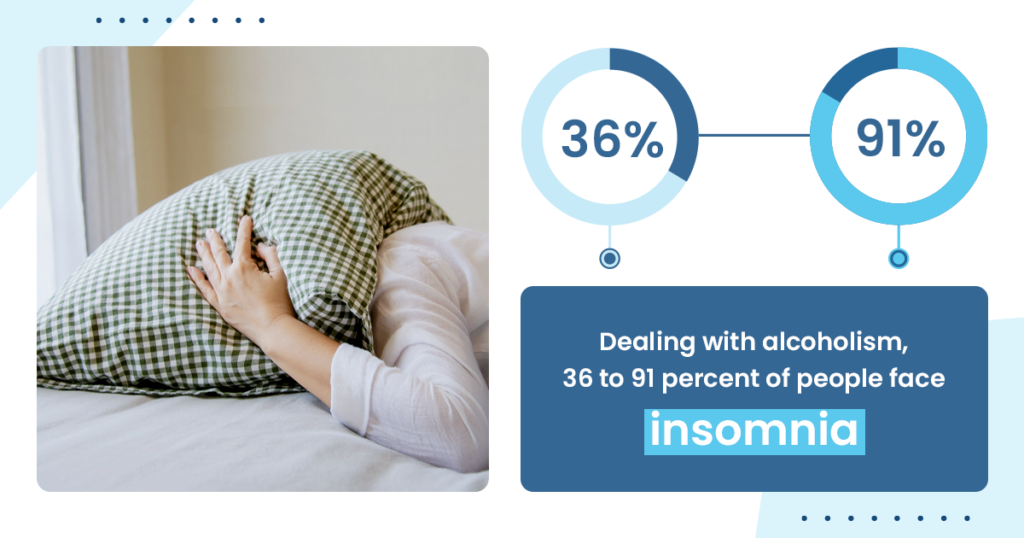
Struggling with alcoholism is an experience that is different for everyone. The withdrawal from mood-altering substances such as alcohol can lead to sleeplessness, making the person extremely tired, or it can lead to severe insomnia, depending on the person. They may also face a lack of excitement and irritability that can linger for weeks, months, or years.
Research shows that 58% of men develop insomnia during the first six days of alcohol withdrawal. If the sleep disturbances aren’t appropriately addressed, the chances of alcohol relapse are higher. Alcohol use can lead to sedation, making it difficult to sleep when someone quits drinking.
With circadian rhythm disorder, it is normal to have sleeping issues. There is a requirement for medical supervision to get the best recovery from alcohol addiction and get a night of much-needed restful sleep.
Alcohol Withdrawal Symptoms and Sleep Issues
Sleep issues are more common in those detoxing from drugs or alcohol. If you are in the early phases of rehabilitation, you may experience it. According to a Journal of Addiction Medicine study, people in early recovery are five times more likely to face sleeplessness.
After detoxification, your withdrawal symptoms can worsen, but with medically assisted help, you can overcome these challenges. Those in recovery from alcoholism may find it harder to get to sleep and stay asleep throughout the night. There are many treatment options for treating the sleep disorder after the alcohol withdrawal symptoms start.
Those dealing with alcoholism are more likely to suffer from insomnia than the general population, according to estimates ranging from 36 to 91%. The sleepy effects of drinking alcohol may seem like a reasonable justification for doing so to combat stress. It is sedative that your body quickly adapts to this if you continue. Increasing self-administered alcohol before bedtime may contribute to this rapid tolerance building.
Withdrawal Symptoms of Alcohol Use
There can be plenty of issues associated with withdrawal from alcohol:
- Restlessness
- Flu-like symptoms
- Fatigue and weakness
- Headaches and high temperature
- Delirium tremens
- Nausea and vomiting
- Depression and anxiety
Insomnia has been linked to diabetes, cardiovascular disease, depression, and obesity. It is possible to receive the rest your body requires while also ensuring that you get enough sleep if you have good enough sleeping habits. In the evening, many people turn to alcohol to help them relax or drift off to sleep.
Alcohol’s sedative characteristics play a role in its cognitive depressant features. Alcohol dependence can be harmful after you try to quit drinking, as withdrawal symptoms can kick in and disrupt your sleep.
Those who have sleep issues are more prone to suffer from depression and hypertension. They are also at the risk of heart attacks than those who get enough sleep each night. If you have insomnia, you may be less productive at work, take more extended vacations, and have a lower quality of life.
Sleep Issues and disorders
Even if someone has quit drinking for a while, they may still have trouble sleeping for months after getting sober. Studies show that treating sleep problems during recovery can help people stay sober for the long term and not go back to drinking.
More than one in ten people who have trouble sleeping use alcohol as a hypnotic. Relapse is possible even after years of being clean, so it is essential to receive treatment before it can get any more severe.
Sleep apnea often causes people to snore or gasp for air while sleeping. These pauses in breathing could make it hard to fall and stay asleep. Obstructive sleep apnea is caused by a physical blockage in the back of the throat. While CSA is caused by the brain not communicating with the muscles that control breathing (CSA).
Frequently Asked Questions
Do you get insomnia when you stop drinking?
Alcohol withdrawal can play a massive role in insomnia during recovery. Since alcohol is a form of sedative, an extended break after long periods of drinking can cause issues when trying to fall asleep at night since your body has become dependent on the substance to get sleep.
Why do I have trouble sleeping when I stop drinking?
Since alcohol is a sedative substance, it is normal to experience insomnia when taking extended breaks from drinking. This is because of the dependency your body has developed on alcohol.
How long after you stop drinking? Do you sleep better?
Insomnia as a result of withdrawal can be different for everyone, but on average, it should improve about a week after treatment begins.
Does alcohol withdrawal cause vivid dreams?
The withdrawal symptoms of alcoholism also lead to vivid dreams as withdrawal involves a disturbance in sleep cycles. These dreams are more detailed, and you often remember the events in your dream.
Find Treatment for Alcoholism at The Haven Detox Center
Withdrawal from alcohol can be challenging to handle independently due to the uncomfortable symptoms of detoxing from a substance. The Haven rehab center has a team of professionals who have helped hundreds of patients comfortably and successfully recover from their addiction.
Our facility has everything a patient needs for the smoothest recovery possible, from our proven detox methods to our therapy sessions that are effective at preventing relapse. The Haven offers residential and outpatient care to best match the needs of our patients.
When you are ready to take this big step toward sobriety, contact us at (561) 328-8627 for more information.